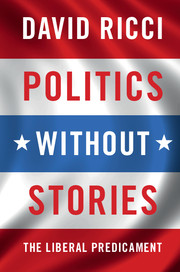Postscript
Published online by Cambridge University Press: 05 August 2016
Summary
By winning several primary elections on June 7, 2016, Hillary Clinton assured herself a majority of pledged delegates to the Democratic nominating convention scheduled to convene in Philadelphia in July. Perhaps most importantly, on June 7 she defeated Bernie Sanders in the California Democratic primary. Yet the approximately 56–44% margin of her victory there showed that many rank-and-file members of her party were still cool to her candidacy. Therefore pundits were intensely curious about what impact these June events might have first on Clinton's nomination campaign and later on the national election in November.
I decided, though, that a more general issue should be addressed here, because Politics Without Stories presented a thesis about political narratives rather than speculation about who might win any particular election. Consequently, readers who followed news reports about caucuses and primary elections in the first half of 2016, after most of this book was written and sent to press, may wonder how what happened in the liberal camp – between Clinton and Sanders competing for delegates on their way to the Democratic nominating convention – did or did not fit into what I have described as the liberal predicament. It is too early for me to draw firm conclusions about that, but here are some plausible lines of analysis.
The Candidates
Hillary Clinton projected no narrative about America's current situation. She did not tell a tale about where the country was, how it got there, and how, if necessary, life in America could be improved. Instead, to use James Kloppenberg's term, she was “philosophically pragmatic,” promoting many policy proposals touching upon foreign affairs, minority rights in America, feminism, poverty, pre-school education, environmental difficulties, the banking system, immigration reform, political fundraising, and more. She therefore resembled Democrats like Rahm Emmanuel, Charles Schumer, and Barak Obama, who I cited as examples of liberals who promote lists of governmental projects.
Against the story that Sanders told – we will come to that in a moment – Clinton spoke to Democrats about how she was a realist, about how well informed she was on political issues, about how being knowledgeable helped her to understand what government can and cannot do, about how she could translate what she knew about public affairs into effective public policies, and about how, if elected, she would do in Washington what she promised to do there during the primaries.
- Type
- Chapter
- Information
- Politics without StoriesThe Liberal Predicament, pp. 209 - 216Publisher: Cambridge University PressPrint publication year: 2016

